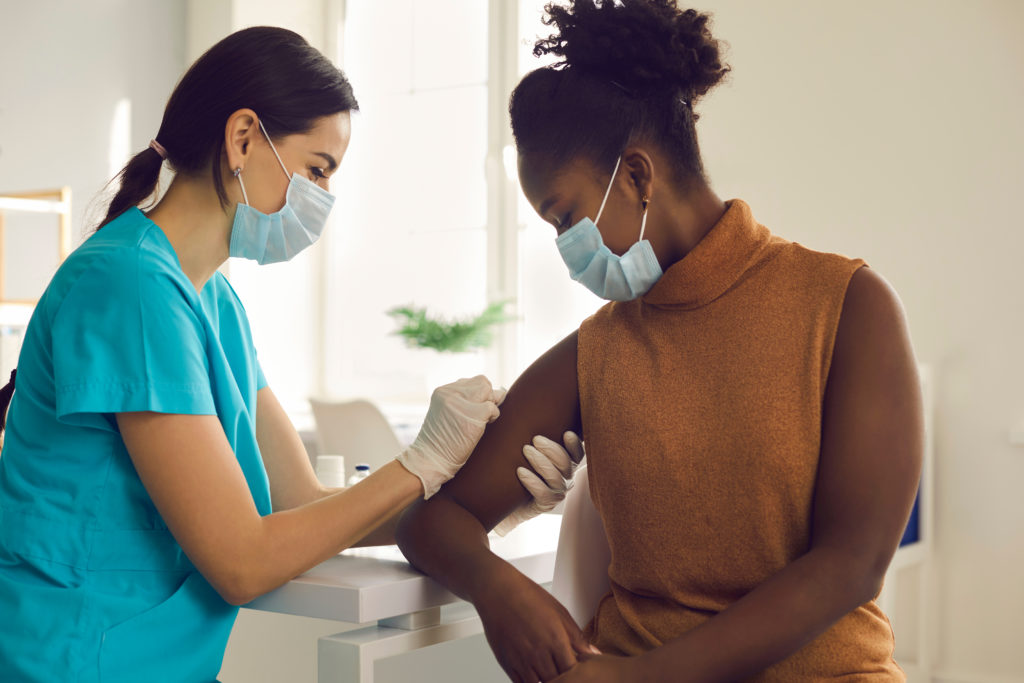Key Insights
- A report from Modern Healthcare and studies show that patients of color are less likely to get the COVID-19 vaccine due to vaccine hesitancy.
- Patients cited anxiety over how researchers were able to create the vaccine in such a short span of time, how it is distributed, and its effectiveness.
- The Centers for Disease Control and Prevention (CDC) has information in place to help physicians address any concerns their patients may have regarding the vaccine.
Background
Modern Healthcare reported on the subject of vaccine hesitancy at a “makeshift vaccination center in a safety-net Chicago hospital.” “[J]ust 37 percent of the 600 doctors, nurses, and support staff” at the hospital “have been vaccinated even though healthcare workers are first in line. Many holdouts come from the mostly Black, working class neighborhoods surrounding the hospital, areas hard hit by the virus yet plagued with vaccine reluctance.”
The Kaiser Family Foundation recently conducted a poll to collect and analyze “data on COVID-19 vaccinations by race/ethnicity to gain increased insight into who is receiving the vaccine and whether some groups are facing disparities in vaccination.” The results showed that “across the 23 states reporting vaccination data by race/ethnicity, there was a consistent pattern of Black and Hispanic people receiving smaller shares of vaccinations compared to their shares of cases and deaths and compared to their shares of the total population.”
COVID-19 Vaccine Hesitancy
The Journal of Ambulatory Care Management defines vaccine hesitancy as “the reluctance or unwillingness to be vaccinated or have oneʼs children vaccinated against a disease, even if proven safe and effective.” Studies show that nearly “two in five adults are hesitant about getting the COVID-19 vaccine,” and that “male, older, and white,” individuals are more likely to vaccinate.
Fifty-seven percent of survey respondents who indicated they were unlikely to receive the vaccine cited “concerns about vaccine side effects,” 34.1 percent reported “worries about allergic responses to the vaccine,” 27.4 percent had “doubts about vaccine effectiveness,” and 23.3 percent stated they had a “preference for developing immunity through infection” as their main reasons for hesitancy.
Evidence shows that patients of color may be less likely to vaccinate for several reasons. Studies show that “health disparities present in the spread and treatment of COVID-19 were reflected in survey participants’ vaccination hesitancy estimations. The pandemic has especially burdened the African American, Latino, and Native American communities, who account for a disproportionate number of COVID-19 cases and deaths.”
Other possible causes include “mistrust in medicine, science and public health, which has been shown to be high in these groups, providing the foundation for safety and effectiveness concerns. Another issue are the existing health care disparities that arise from adverse social and economic conditions. Similarly, improvements in health have not been distributed equally across racial, ethnic, and economic groups, negatively impacting the social determinants of health for minority populations in the U.S.”
In addition, “traditional media and social media may both play a role in the development of COVID-19 vaccine hesitancy. It has been observed that the nation’s response to the pandemic has been hindered by the politicization of public policy and discourse about the origins, spread and containment of COVID-19.”
Alleviating Fear and Anxiety
The CDC has put together information to help physicians address the concerns patients may have about the COVID-19 vaccine. Studies show that patients are more likely to get the vaccine if their physicians or other healthcare providers have also received it. The CDC recommends that physicians and healthcare providers talk to their patients about the COVID-19 vaccine to understand and address any concerns. For patients who are concerned about the vaccine’s safety, the CDC asks physicians to emphasize that the vaccine is held to the same safety standards as all other vaccines, and that allergic reactions are exceedingly rare.
Physicians can visit the CDC website for more tips on talking to patients about the COVID-19 vaccine.










Related Articles
How to Keep Your Patients From Skipping Mammograms
Kristin Schraa, MD, with Virginia Women’s Center shares how women’s health providers can encourage patients ...
3 Ways Healthcare Can Integrate Behavioral Health and Primary Care
Integrating behavioral health with primary care can lead to better patient outcomes — but how ...
How Can Physicians Support Postpartum Mental Health?
On average, 13 percent of mothers in the United States will develop symptoms of postpartum ...
Engaging Patients in Annual Mammograms
Studies show that a little over 66 percent of women aged 40 and older get ...
What Do Medicare-Aged Patients Want in Their Healthcare?
Within the next 20 years, 20 percent of Americans will be 65 or older. It ...
How Health Systems Grow Stronger With Privia Health
Discover how we helped Health First upgrade technology, align physicians, and accelerate toward value-based care. ...